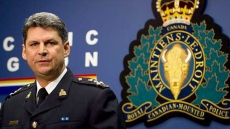The final resting place of the lost ships of the Franklin expedition may remain a mystery for at least another summer.
A thick pack of sea ice is blocking a key part of the search area, making it inaccessible to ships.
The two ships of Sir John Franklin's doomed 1845 expedition — HMS Erebus and HMS Terror — are believed to be somewhere in the Victoria Strait off the west coast of King William Island, perhaps as far down as the Queen Maud Gulf off the Adelaide Peninsula.
Ryan Harris, a senior underwater archeologist who is one of the people leading the Parks Canada search, says it's only a matter of time before the remnants of the missing expedition are found.
Four vessels, including the Canadian Coast Guard ship Sir Wilfrid Laurier, the Royal Canadian Navy's HMCS Kingston and vessels from the Arctic Research Foundation and the One Ocean Expedition are leading the search this summer.
Harris says 75 per cent of the southern area and 40 per cent of the northern area have been searched.
This year, however, there is more ice than usual, which could stop the ships from searching part of the area.
"2009 was a bad year for ice," Harris said, "but we didn't survey with our partners that year, and I'm glad we didn't, because we wouldn't have been able to do anything. A very bad year.
"Apart from that, this is the worst that we've seen."
A strong wind could make all the different by flushing the ice down the strait, he added.
Prime Minister Stephen Harper, who is on his annual tour of the north, got a first-hand look at some of the tools being used in the search.
He boarded a naval vessel at Pond Inlet that travelled west to Eclipse Sound. Upon arriving at a picturesque spot surrounded by ice-capped mountains, Harper and his wife, Laureen, got in a Zodiac and motored out to one of two gigantic icebergs towering in the water.
The prime minister then helped lower an autonomous underwater vehicle into the frigid water.
It was the closest Harper had ever been to an iceberg.
"I've never been that close to a big chunk of ice. It's huge," he said. "That was great. Really exciting."
The prime minister said the lost Franklin ships are an iconic piece of Canadian history.
"It ultimately isn't just a story of discovery and mystery and all those things — but it's also really laying the basis for what's in the longer-term Canadian sovereignty," he said.
"Because it's a mystery, and we've got to solve it."
Harper also expressed confidence that the vessels would soon be found.
"One day we're just going to come around the bend and there's going to be the ship and Franklin's skeleton slumped over the helm and we're going to find it."





